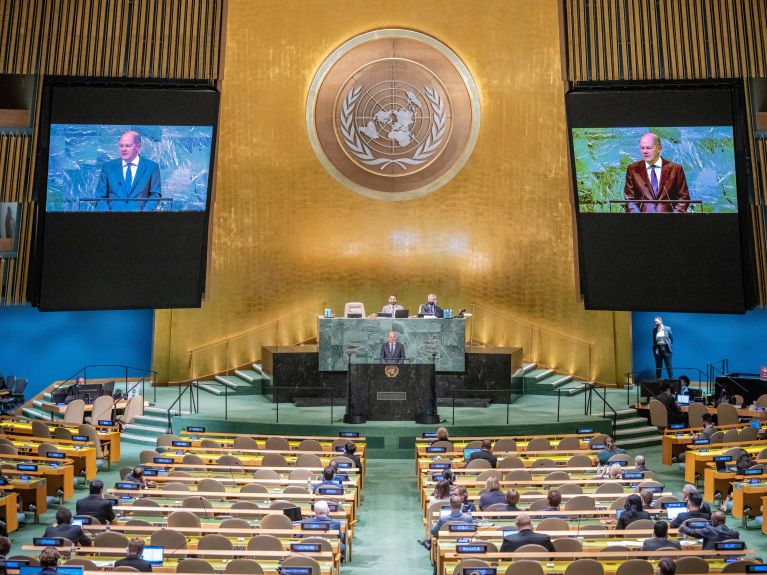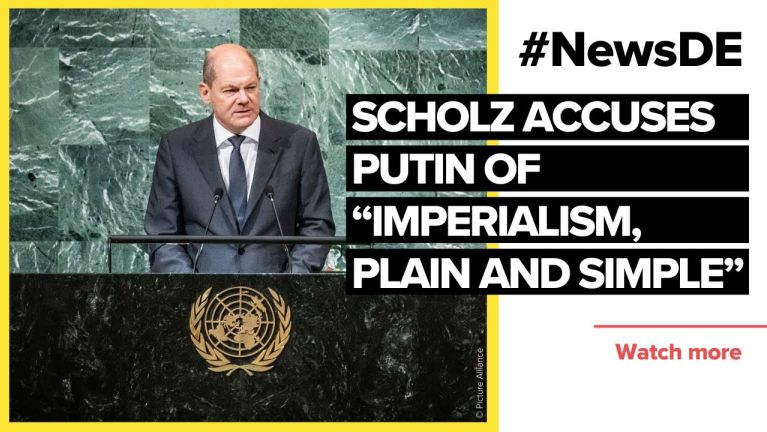Responsibility always begins at home
German Chancellor speaks to the United Nations: Olaf Scholz condemns Russian imperialism and emphasises UN values.

„It is with humility and deep respect that I am addressing you today – both as the newly elected Chancellor of Germany and as a proud delegate to our United Nations.
My country and the United Nations are indivisibly linked. Today’s democratic and reunited Germany owes its role on the world stage to you, our international friends and Partners. You placed your trust in us to become and to remain a peace-loving member of the international community.
We know that we owe our freedom, our stability and our prosperity to an international order with the United Nations at its core. Therefore, my country’s commitment to this organisation and its noble goals – peace, development and equal rights and dignity for every human being – will never wane.
Unfortunately, I’m expressing this commitment at a time during which we’re getting further away from these noble Goals. After decades during which we overcame walls and blocs – a time in which we marked the fall of the Iron Curtain and German reunification – after the technological revolution of the internet and the digital transformation, which have made us more interconnected than ever before, we are now facing a new fragmentation of the world.
New wars and conflicts have emerged. Major global crises are piling up before us and are combining and reinforcing one another. Some have even seen this as a harbinger of a world without rules. It’s true that the risks to our global order are real.
And yet I don’t hold with the image of a world without rules – for two reasons:
Firstly, our world has clear rules. Rules that we, the United Nations, created together. This Charter promises all of us freedom and peaceful coexistence. This Charter is our collective rejection of a world without rules. Our problem isn’t the absence of rules. Our problem is the lack of willingness to abide by and enforce them.
But the image of a world without rules leads us astray for a second reason. If we don’t defend, further develop and strengthen our global order together, then it isn’t chaos without rules that we face, but a world in which the rules are made by those who can dictate them to us by dint of their military, economic or political power.
The alternative to a rules-based world isn’t anarchy, but the dominion of the strong over the weak. The vast majority of us cannot be indifferent to whether the rule of power or the power of rules wins the day. The key question that we as an international community face is this: should we stand helplessly by and watch as some seek to cast us back into a global order in which war is a common instrument of politics; in which independent nations have to submit to their stronger neighbours or their colonial masters; in which prosperity and human rights are a privilege of the lucky few?
Or will we manage to stand together and ensure that the multipolar world of the 21st century remains a multilateral world?
My answer, as a German and a European is this: we have to manage this. And we will manage this if we take three fundamental principles to heart.
Firstly, the international order doesn’t happen by itself. If we do nothing, then this Charter is but a piece of paper. This Charter calls on all of us to uphold its purposes and principles. We mustn’t stand idly by when a major nuclear power armed to the teeth – a founding member of the United Nations and a permanent member of the UN Security Council no less – seeks to shift borders through the use of violence.
There is no justification whatsoever for Russia’s war of occupation against Ukraine.
President Putin is waging this war with one single objective: to seize Ukraine. Self-determination and political independence do not count for him.
There is only one word for this. This is imperialism plain and simple!
The return of imperialism is not only a disaster for Europe. It is also a disaster for our global peaceful order, which is the antithesis of imperialism and neo-colonialism. That’s why it was so important that, here in this room, 141 countries categorically condemned Russia’s war of occupation.
But that alone isn’t enough! If we want this war to end, then we cannot be indifferent to how it Ends. Putin will only give up his war and his imperialist ambitions if he realises that he cannot win. In so doing, he isn’t just destroying Ukraine but is also ruining his own Country. This is why we will not accept a peace dictated by Russia – and we will not accept any sham referendums either.
This is why Ukraine must be able to defend itself against Russia’s Invasion. We’re supporting Ukraine with all our might – financially, economically, with humanitarian assistance, and also with weapons. Together with our partners around the world, we have imposed tough economic sanctions on the Russian leadership and Russia’s economy.
This is how we are making good on a promise that each and every of our countries made when joining the United Nations, namely to join forces ”to maintain international peace and security“. There’s one more thing that I would like to add, which is that not one sack of grain has been held back on account of these sanctions. Russia alone has prevented Ukrainian grain ships from putting out to sea, bombing ports and destroying agricultural Enterprises.
“Where hunger prevails there can be no peace”. My predecessor, Nobel Peace Prize winner Willy Brandt, said this when he addressed this Assembly, as the first Federal Chancellor to do so, in 1973. Today, we are witnessing that this sentence also works the other way around. Those who want there to be no hunger must ensure that Putin’s war does not prevail – this war, which even in countries far away from Russia is leading to rising prices, energy scarcity and famine.
The fact that grain exports have been made possible once again thanks to the mediation efforts of Secretary-General Guterres and Turkey deserves great respect. Germany is also supporting Ukraine with the export of Food. And we will stand by Ukraine when it comes to shouldering the enormous costs for rebuilding the Country. At an international expert conference, which I’m hosting with the President of the European Commission in Berlin on 25 October, we will, together with supporters of Ukraine from all around the world, think about how we can manage this Herculean Task.
Our message is this: we stand firmly at the side of those under attack. For the protection of the lives and the freedom of the Ukrainians. And for the protection of our international order.
The second principle for preserving this order is as follows: all of us will be judged against the obligations that we have jointly entered into.
Responsibility always begins at home.
Take climate change, for example, which is the biggest challenge of our Generation. We, the industrialised countries and major emitters of greenhouse gases, have a very special responsibility here. It was with this in mind that we reiterated our intention at the G7 Summit in Germany in June to forge ahead in order to achieve the 1.5 degree target. Not in spite of the war and the energy crisis, but precisely because climate neutrality also leads to greater energy security.
We stand by our pledges to support emerging economies and developing countries in their efforts to reduce emissions and to adapt to climate change – with new just energy transition partnerships, for example. And we will not abandon the countries that are struggling the most in the face of loss and damage as a result of climate Change.
By the time of the Climate Change Conference in Egypt, therefore, we want to establish a global shield against climate risks. Our yardstick must be the obligations that we have entered into. Nowhere does this insight seem more obvious to me than in the protection of human Rights. Because they reflect the deepest need of each and every one of us to live our lives in freedom, unharmed and in dignity.
This lies at the heart of what makes us humans who we are and what we have in common – no matter where we come from, no matter what we believe, no matter who we love.
I tell you this with the history of my country in mind. Germany, which betrayed all civilised values with the murder of six million Jews, an act that is without parallel, is aware of just how fragile our civilisation is. And, at the same time, we have an obligation to respect and to defend human rights at all times and in all places.
My country is the second-biggest donor to the UN system and also the second‑biggest donor of humanitarian assistance. We have taken in millions of refugees here in Germany in recent years – from the Middle East, Africa, Afghanistan and, most recently, from Ukraine. This is something we are proud of.
But we also have to pay heed and take action where hundreds of thousands are made to endure suffering, tyranny and torture in prison camps or jails – in North Korea, Syria, Iran or Belarus. We must pay heed and take action when the Taliban deprive women and girls in Afghanistan of their most basic Rights. And we must pay heed and take action when Russia commits war crimes in Mariupol, Bucha and Irpin.
We will bring the murderers to justice.
We are doing everything in our power to support the International Criminal Court and the Independent International Committee of Inquiry established by the Human Rights Council. Bolstering our common institutions – that is what especially those who bear particular responsibility for our order in the world by dint of their strength and their influence should have an interest in.
The former High Commissioner for Human Rights briefed us about the situation of the Uighurs in Xinjiang a few weeks ago. China should implement the High Commissioner’s recommendations. That would be a sign of sovereignty and strength and a guarantee of change for the better.
A third principle must be taken into consideration if we are to preserve the international order. We must adapt our rules and institutions to the reality of the 21st century. Far too often, these rules and institutions reflect the world of 30, 50 or 70 years ago.
That also goes for the United Nations Security Council. Germany has, for many years, been committed to its reform and expansion, first and foremost to include the countries of the Global South. Germany is also prepared to assume greater responsibility – as a permanent member and initially as a non-permanent seat in 2027/28. I kindly ask you to support our candidacy – the candidacy of a country that respects the principles of the United Nations and which offers and seeks cooperation.
It is, to my mind, entirely natural that the up‑and‑coming, dynamic countries and regions of Asia, Africa and southern America must be given a stronger political voice on the world stage.
That’s in all of our interests as it gives rise to joint responsibility and greater acceptance for our decisions. Nationalism and isolation will not solve the challenges of our age.
More cooperation, more partnership and more involvement is the only reasonable response, whether for the fight against climate change or global health risks, inflation and disrupted supply chains or our approach to displacement and Migration.
I say this with profound conviction. The insight that openness and cooperation safeguard peace and prosperity has made the past decades the happiest in the history of my country so far. As this year’s G7 President, it is therefore a key priority for me to promote a new form of cooperation with the countries of the Global South – cooperation that not only claims to take place on a level playing field, but one on which actors genuinely see eye to eye. Especially since this level playing field has existed de facto for a long time, if we consider the growing political, economic and demographic clout of Asia, Africa and southern America.
From the outset, we coordinated our objectives very closely with Indonesia as the holder of the G20 Presidency. We have involved the countries holding the Chairmanship of the African Union and the Community of Latin American and Caribbean States in our discussions as the G7, as well as India and South Africa.
This gave rise to new models of global cooperation, which have one thing in common, namely the fact that they are characterised by joint responsibility and mutual solidarity. We’re fighting the hunger crisis with a new Alliance for Global Food Security, and I would like to invite you all to join this Alliance. We have launched a Partnership for Global Infrastructure and Investment in order, together, to mobilise 600 billion dollars for public and private infrastructure investments around the world over the next five years.
Such approaches are pillars that support our international order. Because they deliver results from which citizens in all of our countries stand to benefit and which they expect from the United Nations.
“We the peoples” – it’s not for nothing that these are the first three words of our Charter.
Note that these words are not “We the member states” or “We the delegates”.
We have an obligation to our peoples.
We owe them a global order that allows them to live in peace, which protects their rights and opens up opportunities for education, health and development for them.
Such an order doesn’t come about by itself.
Defending, further developing and strengthening it – that is our task as the United Nations.
Germany extends the hand of cooperation to all of you in this endeavour.“
Speech by Olaf Scholz, Chancellor of the Federal Republic of Germany, at the 77th general debate of the United Nations General Assembly, New York, 20 September 2022
Dieses YouTube-Video kann in einem neuen Tab abgespielt werden
YouTube öffnenContenu tiers
Nous utilisons YouTube pour intégrer un contenu qui collectera possiblement des données sur vos activités. Merci de vérifier les détails et d’accepter le service afin de pouvoir afficher ce contenu.
Ouvrir le formulaire de consentement

